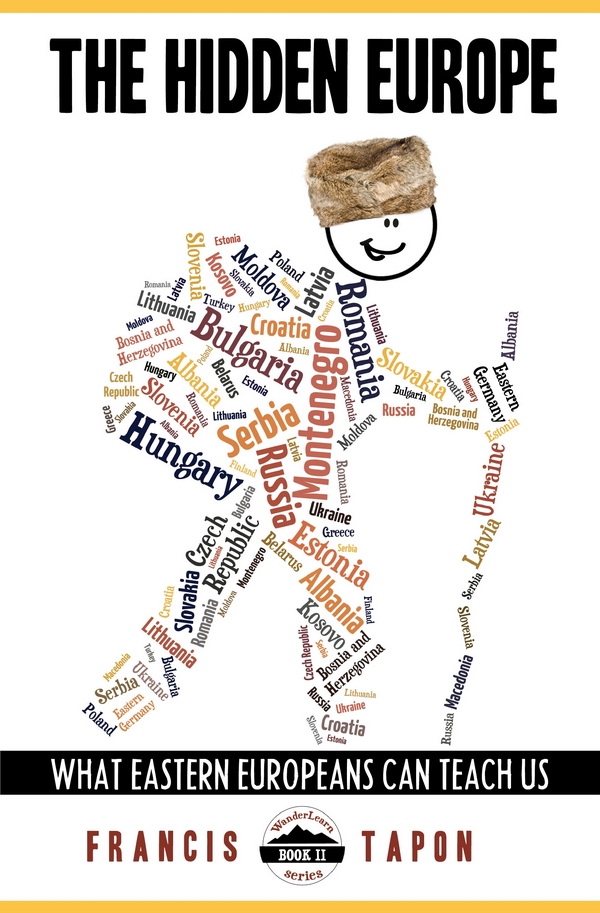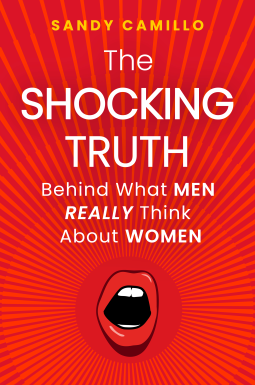Lyubov Fadeeva, Professor of Politics in Perm, Russia, wrote this review of The Hidden Europe in Russian. It's translated below in English (the translation is imperfect). And now Dr. Fadeeva's....
Review of Francis Tapon's The Hidden Europe: What Eastern Europeans Can Teach Us

The book by Francis Tapon book The Hidden Europe. What Eastern Europeans Can Teach Us is estimated by reviewers as an excellent travelogue or travel book. In my opinion, it is a travelogue only in form; in content it is a profound cross-national socio-cultural study. It offers a comparative analysis of 25 countries based on sociological and statistical data, numerous interviews with both common people and intellectuals, inclusive observation, etc. I will strongly recommend it to my students in Comparative Politics.
Tapon warns: "I am not a historian. I am an explorer". He seems to be a real discoverer of "the hidden Europe".
The author pretends to be simple in his explanation: Eastern Europe is the territory situated to the East of Western Europe. But he warns that "Eastern Europe" as a term has a lot of complications and not very pleasant connotations for the people: "Because the world had such a low opinion of Eastern Europeans" as "losers who were on the wrong side of Iron Curtain nowadays nobody wants to admit that they live there" (P.13).
And Eastern Europe (25 countries) is still hidden not only for Americans, but for most Europeans too. From the beginning Francis Tapon allows himself a sharp jokes like "the only people who don't seem to care are the Moldovans. They are just happy that Moldova exists" ( P.15).
Most reviewers note the author's brilliant humor. I totally agree: I had a great laugh while reading the book, and I tried to pass on Tapon's humor to my friends and colleagues and to my students. His humor is hot and spicy but not offensive. On the other hand, his book is not entertaining fiction. I would estimate his humor as a research tool because it helps him to analyze, to compare different cultures and customs including offences and prejudices. "The main purpose of this book is positive – to learn the best things about Eastern Europeans; nevertheless, we'll also learn about the stupid and idiotic things in Eastern Europe" (P.16).
Francis Tapon is not afraid to be accused of violating political correctness. He cites jokes Lithuanians make about Estonians: "An Estonian should do 3 things in his life. If he can"; he argues: "Baltic social awkwardness is so high that you might begin to wonder how they ever reproduce...If men are incapable of charming a lady, how do they ever marry and have kids? Jana told me the answer: 'We get drunk.'" (P.85); he discusses the "victimism of Balkanian people. Everybody is a whiny victim and it's always the others guy's fault". (P.296).
(By the way, I asked my Estonian female colleague about their men, citing Francis Tapon. She laughed a lot and answered that it is true).
At the same time Francis Tapon is truly correct: he accepts people for what they have, finding in every country and society their own highlights and "peppercorns". Among other things he describes national preferences in food, in the specificity of language, characterizing Czech as a language without vowels and Slovenian as a language without swearwords (the rudest phrase in Slovenian is "tristo kosmatih medvedov", what means 300 hairy bears).
His book is, of course, very useful for tourists: he recommends sightseeing, meals, sentences and gives references on the Internet sites. In this sense this is a travel book. But the author first of all is interested to listen to people and to understand people.
He aims to help his reader to understand too by proposing to get into other people's skin. For example, the Croatian politician Tudman used the slogan "Tudman, not the Balkans". Tapon compares with the USA: the same thing would be to say "Obama, not North America".
Francis Tapon is not a historian but he is very precise in historical facts and data. He reminds the reader of the terrible experience of the Second World War for Polish, Byelorussians, Russians and other peoples of Europe. He argues on the "Trianon trauma" for Hungarians and inquires into the top 18 myths of Trianon and Greater Hungary. He comments on the victimism of Balkanian people, but on the other hand he says that this kind of victimism is better than the victorism of the Americans.
Francis Tapon is really tolerant in respect of cultural, historical, psychological differences between people, countries and nations. There is only one exclusion in this sense: communism. The author rejects it as an ideology, as a policy, as a positive part of history. He writes that the drama of Balkan people began in 1892, when a Slovenian woman gave birth to her son in the Croatian village of Kumrovec. He was Josip Broz, later Tito. The drama of Russia started even earlier, when Karl Marx have met Friedrich Engels. In Tapon's opinion, communism is responsible for most of the bad things in Eastern Europe in the XX Century. There is some simplification of Stalin as a political phenomenon: "A bank robber becomes a mass murderer".
Francis Tapon jokes on 7 Wonders of Communism.
1. Everyone has a job.
2. Despite everyone having a job, nobody worked.
3. Despite nobody working, the plan was 100% complete.
4. Despite the plan being 100% completing, nothing was in the shops.
5. Despite nothing being in the shops, everybody has everything.
6. Despite everybody having everything, everybody was stealing.
7. Despite everybody was stealing, nobody lacked anything.
Francis Tapon uses an efficient and effective approach giving the answer to the question "What Eastern Europeans teach us?" in the end of all 25 chapters. Here are some samples:
- Estonia: Adopt libertarian principles; Sing.
- Latvia: Go mushrooming.
- Lithuania: Recite a poem to receive a gift.
- Belarus: Suck it up.
- Poland: Learn history, but don't take it too seriously; Be a good friend.
- Eastern Germany: How to rebuild a country; How to reintegrate. Have the courage to apologize.
- Czechia. How to avoid wars. Beautify your town. How to make a tasty beer.
- Slovakia. Play outside. Improve your environment.
- Hungary. Avoid boredom. Idolize scientists and engineers.
- Slovenia. Speak many languages. Be hardworking.
- Russia. Appreciate literature and art. Play chess. Don't let the weather affect you. Don't stress.
At the book's conclusion, the author gives a recommendation to the reader: don't read only chapter on his own country. He is absolutely right. I did not find the chapter on Russia very funny. Tapon comes up with really cool cases both in the historical past and in the contemporary situation. I suppose it would be funny for other people. The cool examples are combined with data on low life expectancy and appalling living conditions of old people, especially, in the countryside. My old relatives also live in wooden houses without water, gas and plumbing in the house and get a pension of $200 a month. Russian babushkas are really unflappable. It's true, but not funny.
Francis Tapon compares Russians and Americans finding some common features which are not very good for other peoples. He characterizes Russian politicians very much to the point. He concludes the chapter on Russia with the words: "When you are facing tough times, think of Russia, stay strong and keep going".
The book ends with the author pointing out some negative Eastern European traits in comparison with the Western people like less tolerance to minorities, strangers, less belief in meritocracy, more suckers for conspiracy theory, more corruption, worse roads. On the positive side, he notes toughness," a balanced work ethic and a commitment to traditions, focus on families, are well-connected with their history and hospitality".
Throughout the book Francis Tapon draws attention to the fragility of the world and declares to remember that "we are all at the crossroads".
I have been to most of the Eastern European countries and I have contacts with colleagues from all of them. So I intended looking through the book quickly. But it was impossible. The narrative is overpowering, and once you start you can't stop.
I felt like I was following the author hitch-hiking on the night roads, climbing up the hills, meeting and talking to people, attempting to understand their customs, conversations, problems, tasting unusual food. I knew a lot before and I've learned so much more on reading the book. And above all I got a real pleasure from the author's style and from his sense of humor.
I do hope that Francis Tapon's book, The Hidden Europe, will be translated and published in Russian. Anyway, it is my desk book both for my Comparative Politics course and for pleasure.
Lyubov Fadeeva
Professor of Politics
Perm State University, Russia




